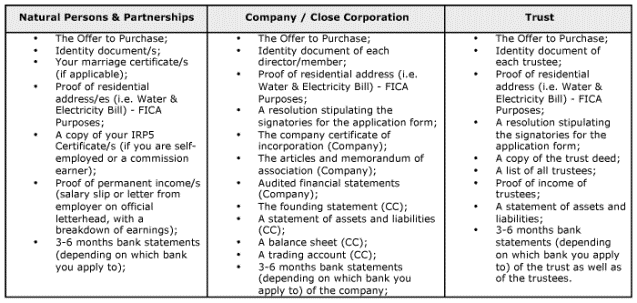 |
Banks’ Lending Policies have changed dramatically in the last couple of months.
It is becoming increasingly difficult for a buyer to obtain a loan from the bank to finance a property purchase. The introduction of the National Credit Act, about 2 years ago, has tightened the lending criteria by which banks may offer finance, in order to prevent reckless lending. Property prices have gone up phenomenally. The interest rate has hiked substantially, and to top it off; banks have tightened up on their lending policies…
|
|
In the past (before the late 90’s) banks used to insist that a home loan application is accompanied by a deposit of at least 20% of the purchase price. Then, (sometime during the late 90’s), in an attempt to make home finance more accessible to lower income earners the banks started reducing this deposit percentage, and eventually started offering buyers bonds of up to 108%. This meant that buyers did not need to put down any amount as a deposit, they would obtain a loan of 100% to the value of the property, plus another 8% to assist with the registration and transfer costs, i.e. attorneys fees, transfer duty, and so on.
Obviously, a monthly bond repayment on 108% loan to value (LTV) would be somewhat higher than a repayment of 100% LTV, and is considerably higher than a repayment of, let’s say, 85% LTV… Borrowers (and the banks) were ‘taking advantage’ of the low interest rates, and not considering what would happen to these 108% bonds if the interest rates went up by a few basis points – which they did! Now many borrowers are facing financial difficulty, and the banks are losing money.
In the last couple of months, the banks have all changed their home loan lending policies. No longer can you obtain a bond for 108% of the property value. In fact, in certain instances, you may only qualify for 60% of the purchase price and the rest (including the bond costs) will have to be paid out of your pocket. Many people who could have qualified for a home loan last year may not be able to qualify this year. And with house prices declining now starting to decline, due to the current economic climate, many properties no longer offer the same security for the banks to afford the home loans that they once did, hence some banks have even attempted to withdraw home loans that had already been approved.
Here is a generalised breakdown of the current home loan lending policies of the four major retail banks.
[PLEASE NOTE that each bank has different policies (which have been revised and amended several times in the last couple of months, so they are likely to change again) and each application is subject to other lending criteria pertaining to your personal financial situation. The figures in the table below are averages taken from all four major retail banks, and may not be a true reflection of your preferred bank’s policies. Please contact your banker to obtain up-to-date accurate lending policies.]
|
|
Affordability is no longer a simple “30% of Gross Income” ratio.
Credit providers have to perform an affordability assessment before granting credit (home loans, vehicle finance, overdrafts, credit cards, secured loans, credit guarantees, and so on) and consumers have to prove there financial standings. Financial institutions may no longer use the “affordability = 30% of gross income” rule that they used to apply to assess affordability for a home loan. The banks will be obliged by law to assess your financial situation in more depth, in terms of your total credit exposure, domestic expenditure and asset value.
The National Credit Act, which came into effect on 1 June 2007, requires that the credit provider (bank) or its agent (estate agent or mortgage originator) takes the necessary steps to make sure that the consumer understands and appreciates the risk and cost of the proposed credit, as well as the consumer’s rights and obligations under the credit agreement.
The analysis of your financial situation by the bank will depend on a number of factors, for instance:
-
The property must be a mortgageable property;
-
Your age, you must be 18 years or older;
-
Are you a South African Citizen (or a foreigner in possession of a valid South African residence permit)?;
-
The stability of your employment for at least 2 years (in the same career stream);
-
The amount you apply for;
-
Your monthly income;
-
Your expenses;
-
You current credit exposure (how much debt you are currently contracted to);
-
Whether you have a deposit, and the amount thereof;
-
The amount of years over which you would like to repay your home loan;
-
The current Interest Rate;
-
Your clear credit record;
-
You insolvency status – you may not be an unrehabilitated insolvent;
-
In the case of purchasing a sectional title unit, the body corporate must be up to date with payments of rates and taxes, and the body corporate should be functional.
Applying for your home loan.
Your banker/financial adviser will take you through all the necessary steps and the forms that need to be completed. Your application is then submitted to the bank’s credit department for assessment.
Possible documentation your bank may require:
|
|
Approval of Your Home Loan
Your home loan application could be refused if the bank feels that there is a risk involved, or if they are putting themselves in financial jeopardy by granting you a bond. You will be notified by your banker if your application is not successful. A home loan approval can take up to 3 weeks depending on complications that may arise. Registration of a bond can take anything from 6 weeks to 6 months, also depending on what complications may arise. If your loan is approved you will be advised on the home loan option/s best suited to you.
This article was provided by Property Power. To order this book online click here.
|







